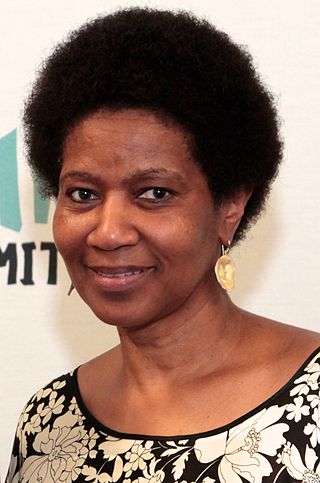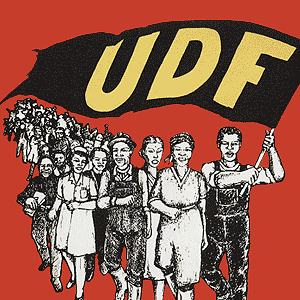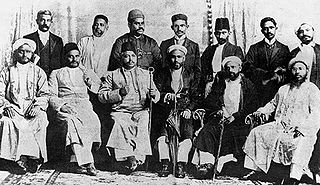Related Research Articles

Fatima Meer was a South African writer, academic, screenwriter, and prominent anti-apartheid activist.

Victoria Nonyamezelo Mxenge was a South African anti-apartheid activist; she was trained as a nurse and midwife, and later began practising law.

Bulelani T. Ngcuka is a South African attorney, prosecutor and activist, who served as the first Director of Public Prosecutions in South Africa, and is the husband of former Deputy President of South Africa Phumzile Mlambo-Ngcuka.
The following lists events that happened during 1985 in South Africa.
The following lists events that happened during 1955 in South Africa.
The following lists events that happened during 2005 in South Africa.

Phumzile Mlambo-Ngcuka is a South African politician and former United Nations official, who served as the Executive Director of UN Women with the rank of Under-Secretary-General of the United Nations.

Umlazi is a township in KwaZulu-Natal, South Africa, located south-west of Durban. Organisationally and administratively it forms part of the eThekwini Metropolitan Municipality and its South Municipal Planning Region.

The United Democratic Front (UDF) was a South African popular front that existed from 1983 to 1991. The UDF comprised more than 400 public organizations including trade unions, students' unions, women's and parachurch organizations. The UDF's goal was to establish a "non-racial, united South Africa in which segregation is abolished and in which society is freed from institutional and systematic racism." Its slogan was "UDF Unites, Apartheid Divides." The Front was established in 1983 to oppose the introduction of the Tricameral Parliament by the white-dominated National Party government, and dissolved in 1991 during the early stages of the transition to democracy.

The Natal Indian Congress (NIC) was a political organisation established in 1894 to fight discrimination against Indians in the Natal Colony, and later the Natal Province, of South Africa. Founded by Mahatma Gandhi, it later served an important role in opposing apartheid. It was the oldest affiliate of the South African Indian Congress.
Clermont is a township of Durban in KwaZulu-Natal, South Africa.
The Women's Protection Bill which was passed by the National Assembly of Pakistan on 15 November 2006 is an attempt to amend the heavily criticised 1979 Hudood Ordinance laws which govern the punishment for rape and adultery in Pakistan. Critics of the Hudood Ordinance alleged that it made it exceptionally difficult and dangerous to prove an allegation of rape, and thousands of women had been imprisoned as a result of the bill. The bill returned a number of offences from the Zina Ordinance to the Pakistan Penal Code, where they had been before 1979, and created an entirely new set of procedures governing the prosecution of the offences of adultery and fornication. Whipping and amputation were removed as punishments. The law meant women would not be jailed if they were unable to prove rape and their complaints of rape would not be seen as confession of adultery.

Dutywa, also known as Idutywa, is a town in Mbashe Local Municipality, Eastern Cape province, South Africa, that was founded in 1858 as a military fort after a dispute between a Natal Colony raiding party and its local people. It is named after the Dutywa River, a tributary of the Mbhashe River. The name means "place of disorder" in the Xhosa language; its spelling was officially changed from "Idutywa" to "Dutywa" on 16 July 2004. The settlement was laid out in 1884 and was made a municipality in 1913. The town is the birthplace of former South African President, Thabo Mbeki.
The World Conference is the governing body of the World Association of Girl Guides and Girl Scouts and meets every three years. If a country has more than one association, the associations form a federation for coordination and world representation.
The following lists events that happened during 2008 in South Africa.

The Congress of the People (COPE) is a South African political party formed in 2008 by former members of the African National Congress (ANC). The party was founded by former ANC members Mosiuoa Lekota, Mbhazima Shilowa and Mluleki George to contest the 2009 general election. The party was announced following a national convention held in Sandton on 1 November 2008, and was founded at a congress held in Bloemfontein on 16 December 2008. The name echoes the 1955 Congress of the People at which the Freedom Charter was adopted by the ANC and other parties, a name strongly contested by the ANC in a legal move dismissed by the Pretoria High Court.
Griffiths Mlungisi Mxenge was born in KwaRayi, a rural settlement outside of King Williams Town, Eastern Cape. He was a civil rights lawyer, a member of the African National Congress (ANC) and a South African anti-apartheid activist.
Florence Grace Mkhize was an anti-apartheid activist and women's movement leader. Mkhize was usually called 'Mam Flo'. Mkhize was also involved in trade unions in South Africa, organizing for the South African Congress of Trade Unions (SACTU).

Kesaveloo Goonam, also known as Kesaveloo Goonaruthnum Naidoo (1906–1998) was a South African doctor and anti-apartheid activist. She was also called "Coolie Doctor", which became the title of her 1991 autobiography.
Shireen Hassim is a South African political scientist, historian, and scholar of gender studies and African studies. She is a Professor in the Department of Political Studies at the University of the Witwatersrand, where she is also affiliated with the Institute for Social and Economic Research. In 2019 she became a Canada 150 Research Chair in Gender and African Politics, beginning a seven-year term in the Institute for African Studies at Carleton University. Hassim was the first woman of colour full professor of political science in South Africa.
References
Citations
- 1 2 Sheldon, Kathleen (2016). Historical Dictionary of Women in Sub-Saharan Africa (2nd ed.). Rowman & Littlefield. p. 202. ISBN 9781442262935.
- ↑ Hassim 2006, p. 134.
- ↑ Geisler, Gisela (2005). Women and the Remaking of Politics in Southern Africa: Negotiating Autonomy, Incorporation and Representation. Nordic Africa Institute. p. 72. ISBN 9789171065155.
- 1 2 "Natal Organisation of Women (NOW)". South African History Online. 30 March 2011. Retrieved 8 September 2016.
- ↑ "Mlungisi Griffiths Mxenge and Victoria Nonyamezelo". The Presidency of South Africa. Retrieved 8 September 2016.
- ↑ Meer 1998, p. 122.
- 1 2 Cherry, Janet (2007). "'We Were Not Afraid': The Role of Women in the 1980s' Township Uprising in the Eastern Cape". In Gasa, Nomboniso (ed.). Women in South African History: They Remove Boulders and Cross Rivers. Human Sciences Research Council. p. 283. ISBN 9780796921741.
- ↑ "The Daily Impact: UN Women Taps Former South African Leader". Impact. 11 July 2013. Retrieved 9 September 2016.
- ↑ Meer 1998, p. 135.
Sources
- Hassim, Shireen (2006). Women's Organizations and Democracy in South Africa: Contesting Authority. The University of Wisconsin Press. ISBN 9780299213831.
- Meer, Shamim (1998). Women Speak: Reflections on Our Struggles, 1982-1997. Kwela Books. ISBN 0795700822.